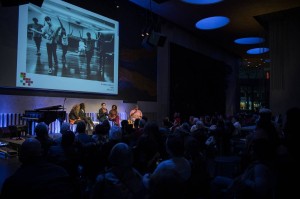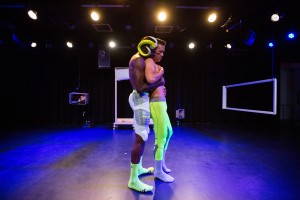Greetings from New York!

I write this Kyoung Update with a heavy heart. The recent mass shooting in Orlando has gravely upset me, as a queer man, as a Latino artist, as an Asian-American artist, and new American. I think about the senseless violence that is killing the young of this country and how Kyoung’s Pacific Beat, a peacemaking theater company, can respond to this violence in a way that is proactive, healing, and in tune with the needs of our community and the artists that work in the company.
Six months ago, I traveled to Santiago, Chile to be in residency at Centro Cultural Gabriela Mistral, with support from a TCG/Global Connections grant funded by the Andrew W. Mellon Foundation. My goal was to lead a community-based theater project with marginalized, young Chilean dancers that gather at GAM to dance Korean Pop choreography. What I discovered in my research process was the story of Daniel Zamudio, a young, K-pop dancing teenager who was murdered by Chilean neo-nazis at a park called Parque San Borjas. His death led to protests that catalyzed the Zamudio law in 2012, which is Chile’s first legislation protecting people against hate-crimes in Chile.
The participants in my project were teenagers exploring their cultural identity, experimenting with gender representations through K-Pop impersonations, and they faced homophobic discrimination under the assumption that people who dance are lesbians or gay. The truth was that most of them were artists, who lacked access to arts education and dance studios. These popular groups from the peripheries of Santiago gathered to rehearse at Parque San Borjas, a park not too far from GAM, and they occupied GAM’s public plazas following Zamudio’s death, as it became clear that these teenagers were not safe in public.

Public safety cannot be taken as a given. I recall “Experimental Peace project,” a community-based project I launched two years ago through Target Margin Theater’s Institute for Collaborative Peace-Making. I made a call to create a project based on what the community felt most important to address in order to prevent violence. Women were the first to respond to the call, stating that street harassment in New York City was a huge issue, so I invited seven women from different disciplines and cultures, to talk about the root causes of this problem. We questioned who has rights on the streets, why men felt in the right to sexually harass women, and we explored solutions to the problem, connecting some of our discussions with the work of Hollaback!, a grass-roots organization that has created systems and tools to report and advocate against street harassment.
Public violence exists and manifests itself in complex manners that are symptomatic of larger systems of oppression. Post-racial, post-marriage equality politics do not address the imminent danger people of color, and queer communities, face in public, at home, in the work place, and in civil society. For months, we have been horrified by the images of black lives taken away through disproportionate police brutality, the countless number of trans people of color killed on the streets, and the countless cases of rape and LGBQT hate crimes, not to mention the growing number of mass shootings across the United States.

Kyoung’s Pacific Beat’s PILLOWTALK is my company’s new work-in-progress and it asks whether queer communities of color can truly celebrate marriage equality in the times of #BlackLivesMatters. We had a sold-out workshop production of the show last September at BRIC Arts Media Center, but we have failed to find a home in New York City for this project to premiere.
From the periphery, it seems like this lack of opportunity to move our work forward is part of a larger inability for artists of color to work in the mainstream. Luckily, with support of The Field’s Leadership Fund Fellowship, which aims to promote diversity and arts equity in the field, our small, experimental company has hired its first Executive Director, Rachel DeGuzman, and with support from ART/NY (Alliance of Resident Theaters of New York), we have formalized our company’s first Leadership Council to expand the scope and reach of our company.
Now, more than ever, I feel it imperative to say “no” to a culture of violence and say “yes” to a culture of peace. We are developing strategic partnerships with artists, peace advocates, community centers, and professionals in the field to make sure that next season, we are optimizing our current opportunities to promote a culture of peace and non-violence, which is the mission of Kyoung’s Pacific Beat.
Personally, I have been challenged to question very deeply what it means to be an artist, while considering a new type of “spotlight” placed upon me as a leader in my community. Looking back at all the personal struggles I have faced as an artist working within the intersections of multiple communities and artistic practices, I decided to join the Dramatist Guild’s Devised Theater Committee, Indie Theater Fund’s Cultural Ambassador program, Sol Project, and The Performance Project @ University Settlement’s Artistic Advisory board, to improve the existing systems that support artists like me, to ensure that doors are kicked open and left open for the next generation.
In a time of violent regression and social degradation, I firmly believe in the need to serve communities and to uphold the democratization of the theater to reflect, and shape, the civic discourse necessary to make this a better world. We need the empathy and creativity to humanely imagine a peaceful future where our differences can be addressed non-violently, and it is my struggle, our struggle, to persevere courageously knowing that our art is of dissent, of resistance, and of social change.
Peace,
Kyoung